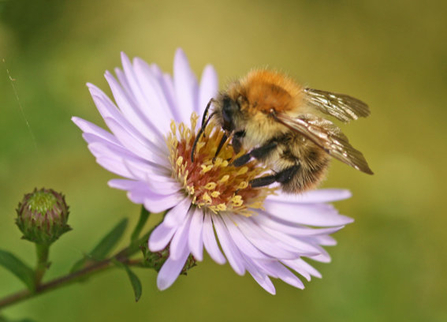
Carder bee © Rachel Scopes

Carder bee © Rachel Scopes
The shorthaired bumblebee died out because its habitats were swept away ... It just needed enough flowers to feed on: no flowers equals no beesProf Dave Goulson"A Sting in the Tail" (Jonathan Cape, 2013)
We are in the midst of the sixth mass extinction event, with extinctions occurring faster than at any time in the last 65 million years, says Professor Dave Goulson, bee expert, best-selling author and founder of the Bumblebee Conservation Trust. In an illustrated online talk on Wednesday 1 July at 7pm, he will demonstrate how ‘bioabundance’ is in decline, citing recent studies which show that insects in particular seem to be disappearing fast, and will suggest how we should tackle this crisis on both a national and local level.
This much-anticipated online event is organised by our Get Cumbria Buzzing project. Tanya St. Pierre, Project Manager for Get Cumbria Buzzing, says: “We’re absolutely delighted to be hosting this live online talk by the UK’s leading expert in bee ecology and conservation and can announce that bookings are now open! While tackling large-scale issues around food production and farming, he’ll also show how we as individuals can all make a difference, in the way we grow plants in our gardens, allotments and backyards.”
Stephen Trotter, Chief Executive Officer of Cumbria Wildlife Trust says: “We can all take action for insects and this event with Dave Goulson is a great way of finding out how, from one of the UK’s top experts. We need to urgently bring back wildlife across Cumbria and the UK, let’s start with the small things that have a big role.”
Chloe O’Hare, Environment Team Manager for Highways England, one of the Get Cumbria Buzzing project partners, says: “Get Cumbria Buzzing involves sharing skills and knowledge across sectors to enable delivery of habitat improvements that benefit pollinators across the landscape. The online talk from Dave Goulson is welcomed as it helps highlight the importance of projects like this and allows us to learn from latest scientific research and gain expert opinion and feedback. At Highways England, we know that road verges are a key habitat for bees and other pollinators and that we have a responsibility to protect and enhance these habitats wherever we can. We are keen to work with partners and the public to ensure we are playing our part in supporting wildlife.”
As well as publishing academic books and nearly 300 scientific articles, Professor Goulson wrote the The Sunday Times best-seller A Sting in the Tale, a popular science book about bumble bees, which has been translated into fourteen languages. In the book, he gives the example of the British short-haired bumblebee, widespread in the mid-1960s but now extinct. He links the decline of the bee with the intensive farming, pesticide use and habitat loss of the post-war era, when there was a need to increase food production. He writes in the book: “The shorthaired bumblebee died out because its habitats were swept away. It wasn't all that fussy, it just needed enough flowers to feed on: no flowers equals no bees.”
Tanya says: “Across the UK, bumblebees and other pollinating insects are disappearing at an alarming rate. More than half of our bee, butterfly and moth species have declined in the past 50 years, and 30 species of bees face extinction. Over the last 75 years we’ve lost 97% of our flower rich meadows, 50% of our hedgerows, and 60% of flowering plants are in decline.
“We need to act now to save these precious pollinators, and it’s great to have such a highly-respected expert as Dave Goulson to spell out what we can do to avert what he calls ‘an insect apocalypse’. His talk will be accessible to all, appealing to both specialists in the field and members of the public who want to help bees.
“Dave was due to deliver this talk in person, while visiting our project base near Carlisle, to see how Get Cumbria Buzzing is responding to this ecological crisis, but we’re delighted that he can now deliver the talk online, to a much bigger UK-wide audience!”
Averting the Insect Apocalypse, an illustrated online talk by Professor Dave Goulson, takes place on Wednesday 1 July at 7pm.